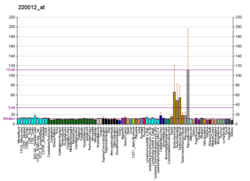ERO1LB
ERO1-like protein beta is a protein that in humans is encoded by the ERO1LB gene.[5][6]
Interactions
ERO1LB has been shown to interact with P4HB.[7][8]
gollark: https://john.citrons.xyz/static/img/experience.png
gollark: But squarer.
gollark: Your album art should look like this good ad.
gollark: https://john.citrons.xyz/static/img/meta-meta.png
gollark: A picture of a bee.
References
- GRCh38: Ensembl release 89: ENSG00000086619 - Ensembl, May 2017
- GRCm38: Ensembl release 89: ENSMUSG00000057069 - Ensembl, May 2017
- "Human PubMed Reference:". National Center for Biotechnology Information, U.S. National Library of Medicine.
- "Mouse PubMed Reference:". National Center for Biotechnology Information, U.S. National Library of Medicine.
- Pagani M, Fabbri M, Benedetti C, Fassio A, Pilati S, Bulleid NJ, Cabibbo A, Sitia R (August 2000). "Endoplasmic reticulum oxidoreductin 1-lbeta (ERO1-Lbeta), a human gene induced in the course of the unfolded protein response". The Journal of Biological Chemistry. 275 (31): 23685–92. doi:10.1074/jbc.M003061200. PMID 10818100.
- "Entrez Gene: ERO1LB ERO1-like beta (S. cerevisiae)".
- Anelli T, Alessio M, Mezghrani A, Simmen T, Talamo F, Bachi A, Sitia R (February 2002). "ERp44, a novel endoplasmic reticulum folding assistant of the thioredoxin family". The EMBO Journal. 21 (4): 835–44. doi:10.1093/emboj/21.4.835. PMC 125352. PMID 11847130.
- Mezghrani A, Fassio A, Benham A, Simmen T, Braakman I, Sitia R (November 2001). "Manipulation of oxidative protein folding and PDI redox state in mammalian cells". The EMBO Journal. 20 (22): 6288–96. doi:10.1093/emboj/20.22.6288. PMC 125306. PMID 11707400.
Further reading
- Mezghrani A, Fassio A, Benham A, Simmen T, Braakman I, Sitia R (November 2001). "Manipulation of oxidative protein folding and PDI redox state in mammalian cells". The EMBO Journal. 20 (22): 6288–96. doi:10.1093/emboj/20.22.6288. PMC 125306. PMID 11707400.
- Anelli T, Alessio M, Mezghrani A, Simmen T, Talamo F, Bachi A, Sitia R (February 2002). "ERp44, a novel endoplasmic reticulum folding assistant of the thioredoxin family". The EMBO Journal. 21 (4): 835–44. doi:10.1093/emboj/21.4.835. PMC 125352. PMID 11847130.
- Gess B, Hofbauer KH, Wenger RH, Lohaus C, Meyer HE, Kurtz A (May 2003). "The cellular oxygen tension regulates expression of the endoplasmic oxidoreductase ERO1-Lalpha". European Journal of Biochemistry. 270 (10): 2228–35. doi:10.1046/j.1432-1033.2003.03590.x. PMID 12752442.
- Molteni SN, Fassio A, Ciriolo MR, Filomeni G, Pasqualetto E, Fagioli C, Sitia R (July 2004). "Glutathione limits Ero1-dependent oxidation in the endoplasmic reticulum" (PDF). The Journal of Biological Chemistry. 279 (31): 32667–73. doi:10.1074/jbc.M404992200. PMID 15161913.
- Dias-Gunasekara S, Gubbens J, van Lith M, Dunne C, Williams JA, Kataky R, Scoones D, Lapthorn A, Bulleid NJ, Benham AM (September 2005). "Tissue-specific expression and dimerization of the endoplasmic reticulum oxidoreductase Ero1beta". The Journal of Biological Chemistry. 280 (38): 33066–75. doi:10.1074/jbc.M505023200. PMID 16012172.
- Lewandrowski U, Moebius J, Walter U, Sickmann A (February 2006). "Elucidation of N-glycosylation sites on human platelet proteins: a glycoproteomic approach". Molecular & Cellular Proteomics. 5 (2): 226–33. doi:10.1074/mcp.M500324-MCP200. PMID 16263699.
- Otsu M, Bertoli G, Fagioli C, Guerini-Rocco E, Nerini-Molteni S, Ruffato E, Sitia R (2006). "Dynamic retention of Ero1alpha and Ero1beta in the endoplasmic reticulum by interactions with PDI and ERp44". Antioxidants & Redox Signaling. 8 (3–4): 274–82. doi:10.1089/ars.2006.8.274. PMID 16677073.
- Dias-Gunasekara S, van Lith M, Williams JA, Kataky R, Benham AM (September 2006). "Mutations in the FAD binding domain cause stress-induced misoxidation of the endoplasmic reticulum oxidoreductase Ero1beta". The Journal of Biological Chemistry. 281 (35): 25018–25. doi:10.1074/jbc.M602354200. PMID 16822866.
This article is issued from Wikipedia. The text is licensed under Creative Commons - Attribution - Sharealike. Additional terms may apply for the media files.




